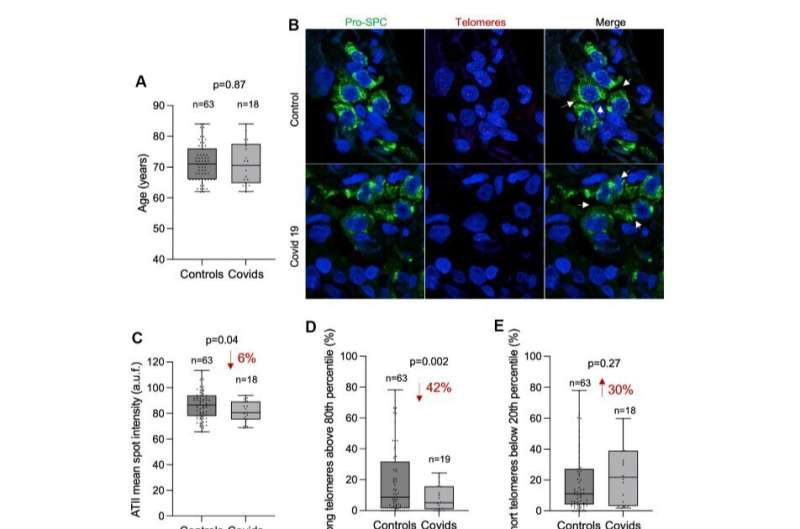This article has been reviewed according to Science X's editorial process and policies. Editors have highlighted the following attributes while ensuring the content's credibility:
fact-checked
proofread
Short telomeres in alveolar type II cells associate with lung fibrosis in post COVID-19 patients with cancer

A new research paper titled "Short telomeres in alveolar type II cells associate with lung fibrosis in post COVID-19 patients with cancer" has been published in Aging.
The severe acute respiratory syndrome coronavirus 2 (SARS-CoV-2) is responsible for the coronavirus disease 2019 (COVID-19) pandemic. The severity of COVID-19 increases with each decade of life, a phenomenon that suggests that organismal aging contributes to the fatality of the disease. In this regard, researchers have previously shown that COVID-19 severity correlates with shorter telomeres, a molecular determinant of aging, in a patient's leukocytes.
Lung injury is a predominant feature of acute SARS-CoV-2 infection that can further progress to lung fibrosis in post-COVID-19 patients. Short or dysfunctional telomeres in Alveolar type II (ATII) cells are sufficient to induce pulmonary fibrosis in mice and humans. In this new study, the researchers above analyzed telomere length and the histopathology of lung biopsies from a cohort of alive post-COVID-19 patients and a cohort of age-matched controls with lung cancer.
The team set out to address whether short telomeres in the lungs of post-COVID-19 patients could be at the origin of virus-induced pulmonary fibrosis. They found loss of ATII cellularity and shorter telomeres in ATII cells concomitant with a marked increase in fibrotic lung parenchyma remodeling in post-COVID-19 patients compared to controls. These findings reveal a link between presence of short telomeres in ATII cells and long-term lung fibrosis sequel in post-COVID-19 patients.
The researchers explain, "As short telomeres can be elongated by telomerase, and telomerase activation strategies have been shown by us to have therapeutic effects in diseases associated to short telomeres, such as pulmonary fibrosis, it is tempting to speculate that such telomerase activation therapies could improve tissue pathologies in post-COVID-19 patients such as lung fibrosis after overcoming the viral infection."
More information: Paula Martínez et al, Short telomeres in alveolar type II cells associate with lung fibrosis in post COVID-19 patients with cancer, Aging (2023). DOI: 10.18632/aging.204755




















